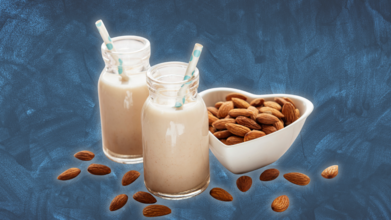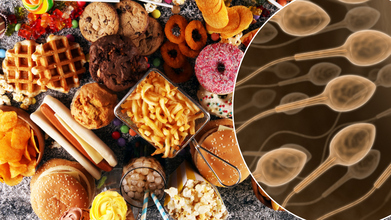- Health Conditions A-Z
- Health & Wellness
- Nutrition
- Fitness
- Health News
- Ayurveda
- Videos
- Medicine A-Z
- Parenting
- Web Stories
Can You Feel Tired After Drinking Coffee?

Credits: Canva
Did this ever happen that you drank coffee but did not feel energetic? Instead, you went right into your bed and slept off. Like we all know, have hard, and seen proofs too that coffee, or caffeine makes us feel alive, and energetic. This is one drink workaholics swear by. But what happens when it no longer makes you feel that way. Ever wondered why?
Many people, including journalist Amy Glover, who writes for Huffpost said that for drinking coffee for her was never to perk her up. She always felt that it made her sleepier. After doing some research herself, she found out that smoking, oral contraceptives, and caffeine "tolerance" among regular drinkers may cause some to feel ready to rest!
Dr Karan Rajan, gastrointestinal surgeon, author, and lecturer who posts health content on his Instagram channel @drkaranrajan talks about coffee and the glitch it causes to some people, which is why they feel tired.
In his video he says, "If caffeine makes you feel tired, it might be because of a software glitch in your caffeine gene". So, what does that really mean?
Why Do You Feel Tired After Drinking Coffee?
The way your body responds to caffeine depends on a type of liver enzyme called CYP1A2. This enzyme affects how sensitive your body is to caffeine. The doctor says, "depending on your metabolism, it could take between two to eight hours to remove half of the caffeine" you have drunk from your system. This is important because caffeine blocks the adenosine receptors, these are the hormones that tells us when we are sleeping.
However, if you metabolise coffee faster, your receptors will be unblocked sooner and you will feel tired.
As per a 2023 study published in JAMA Network, titled CYP1A2 Genetic Variation, Coffee Intake, and Kidney Dysfunction, it was noted that those with a "slower" functional liver enzyme, could develop kidney conditions than those who do not have any caffeine's effects. The doctor too agreed that the caffeine tolerance theory is what happens in your body and leads to you feel tired or active.
Is There Something To Worry About?
Now the biggest question that follows through is if you do not feel active after drinking coffee, is there something wrong with your body? Should you be worried? As per the Sleep Foundation, it says that this could lead to a vicious sleep cycle. If you are not active by drinking coffee, you might drink more to stay alert and active. However, this might make you feel tired at the moment, but keep you up later in the night. This will make you feel more tired in the morning, and you will eventually drink more coffee then. Again, this won't work on your system, but you will be active at night, and this is how the cycle continues.
There are also those theories that claim that if you feel tired after drinking coffee, you might have ADHD. While this may seem counterintuitive, but it can be attributed to the unique neurobiology of individuals with ADHD. Research also suggests that people with ADHD may have a unique dopamine regulation in their brain, which is why they react differently and feel tired after consuming coffee.
Meat May Actually Protect Against Cancer? Controversial Study Challenges Longstanding Warnings

Credits: iStock
Red meat has long been the 'bad guy' of the nutritional world. Health authorities, such as the World Health Organization (WHO), have long cautioned that eating beef, pork, and lamb regularly might increase cancer risk. Bacon, sausages, and deli cuts of meat were declared to be definite carcinogens, serving as the cornerstone of international dietary guidelines to restrict intake. But a new Canadian study at McMaster University has set off a heated controversy by proposing that animal protein, the very food group to which red meat belongs, may actually help shield us from cancer death.
Could that steak on your plate actually be working in your favor? This controversial research suggests animal protein—including meat, fish, eggs, and dairy—might offer unexpected protection against cancer deaths. While it doesn’t give a free pass to unlimited bacon, the findings are turning decades of dietary advice on its head—and sparking a fresh debate about what’s truly healthy to eat.
The McMaster research considered long-term diet and health outcomes, noting that individuals with increased animal protein intake had reduced death from cancer. To initial appearances, this appears to go against the grain of decades of science establishing a connection between red meat and colorectal and other cancers. The media storm which followed understandably presented the news as a flagrant exoneration of meat enthusiasts. Far more is the case, however.
Instead of singling out red meat per se, the scientists looked at "animal protein" as a large category, including red meat, poultry, fish, eggs, and dairy. This is important because all animal proteins do not have the same risk profile. For example, oily fish like salmon, mackerel, and sardines have previously been associated with reduced risks of cancer, while specific dairy foods may prevent colorectal cancer but possibly raise the risk of prostate cancer. By grouping these foods in one category, the study could have captured the beneficial effect of fish and some dairy, hiding the separate roles of red meat.
Another layer of complexity emerges from closer examination of the study's funding. Funded by the National Cattlemen's Beef Association, the main lobbying organization for America's beef industry, the study has to contend with accusations of conflicts of interest. Industry-funded research is not necessarily flawed, but vested interests are involved.
Methodologically, the research did not distinguish between processed and unprocessed meat, a differentiation critical to cancer studies. Extensive literature uniformly demonstrates that processed meats transmit substantially greater carcinogenic risk compared with unprocessed cuts. Further, the research did not assess certain types of cancer, and it left unanswered the issue of whether the protective association holds across all malignancies or only some.
Can Plant-Based Proteins Have The Same Effect on Cancer?
Intriguingly, the study also tested plant protein sources, such as legumes, nuts, and soy foods like tofu, and found no strong protective effect on cancer death. This seems to contradict previous studies associating plant proteins with lower risk of cancer. Although this finding is surprising, it highlights the nuance of nutrition science: food interactions, cooking methods, and lifestyle habits all affect health in ways that are challenging to deconstruct.
This does not devalue the established advantages of plant foods. Fruits, vegetables, and whole grains are still good sources of fiber, antioxidants, and phytochemicals, which all translate to reduced disease risk and overall better health.
Moderation Remains Key
Even if subsequent studies validate some protective benefits of animal protein, it will be unwise to read the results as license to overconsume meat. Too much red meat remains linked with cardiovascular disease, type 2 diabetes, and other chronic diseases. Nutrition professionals stress balance: a regimen featuring varied protein sources, copious amounts of plant foods, and minimally processed foods is still the gold standard.
Nutrition science is seldom binary. It is extremely difficult to isolate the impact of a single food item on multifactorial diseases like cancer. Human beings eat meals as a mixture of foods, depending on culture, lifestyle, and genes. Observational research such as the McMaster study gives useful information but cannot prove causality.
Targeting overall eating patterns is more realistic than dwelling on specific foods. A "balanced plate" philosophy—consisting of moderate amounts of meat, fish, and plant proteins, with fruits, vegetables, and whole grains—represents the most evidence-backed route to sustainable health. For red meat fans, moderation and selection of unprocessed, lean cuts are important.
Meanwhile, the controversy surrounding meat and cancer risk will rage on. As scientists dig deeper into eating habits, types of protein, and lifestyle factors, increasingly detailed advice will follow. In the meantime, the research exists less as a final ruling that meat prevents cancer and more as a reminder that nutrition science is subtle, constantly shifting, and never firm.
In the end, this research provides an interesting twist to current studies but does not topple decades of data that have attributed processed and red meat consumption to increased cancer risk. Eating well, careful portion control, and varied food choices are still the best bets for health-food consumers wading through the often-bewildering realm of nutritional headlines.
National Nutrition Week 2025: What Happens To Your Body When You Drink Almond Milk Everyday?

Credits: Health and me
From roasted almond handfuls as a snack to almond flour in gluten-free cooking, this nut has become a staple in daily diets and when discussing nutrition, almonds nearly always find their way onto the list. With their high levels of healthy fats, antioxidants, and vitamins, this little nut has been touted as a superfood for a long time. But over the past decade or so, almonds have come in a new guise that has appeared in millions of kitchens across the globe—almond milk. Almond milk is creamy, dairy-free, and frequently fortified with important nutrients. It's become the first choice for those who'd rather not indulge in regular dairy.
National Nutrition Week is annually celebrated from September 1 to 7, and it acts as a reminder to take stock of how our diet contributes to our well-being. The theme for 2025, as in the past, is all about balanced diets, nutrient-dense foods, and bringing awareness to silent nutritional deficiencies. Almond milk is perfectly a part of this discussion. Whereas plant-based diets are on the rise due to environmental, ethical, and health considerations, you need to know whether substituting dairy with almond milk is boosting or detracting from your long-term health. What does actually happen when you consume it daily? Is it a good habit—or does it have some secret downsides you should find out?
Also Read: Even 'Minimal' Portion Of Ultra-processed Foods Sabotage Male Fertility And Metabolism
Smooth in texture and nutty in taste, almond milk is now being poured into lattes, blended into smoothies, and stirred into cereal bowls as a substitute for cow's milk. But with so much hype, the question is, is drinking almond milk daily really good for you, or are there unsuspected downsides to be on the lookout for?
Cow's milk has been the default choice for generations—be it for dipping cookies, stirring into oatmeal, or frothing for coffee. However, almond milk sales in the United States have continuously increased year after year, based on figures from the U.S. Department of Agriculture. Although the total effect on dairy sales is still modest, the trend demonstrates shifting consumer values. Individuals are moving to almond milk for a number of reasons:
- Some prefer a vegan or eco-friendly option.
- Others are lactose intolerant or have a dairy allergy.
- And some just like the lower calorie count or milder taste.
Almond milk is dairy free, vegan friendly, and is commonly fortified with calcium and vitamin D, making it a popular replacement. However, its nutritional content is not the same as cow's milk, and that difference holds weight when partaken in every day.
What Exactly Is Almond Milk?
Even though almonds are in the name, almond milk is not created through "milking" almonds. Almonds are soaked, then blended with water and strained to remove a smooth liquid from them. It can be sweetened, flavored, or fortified with vitamins and minerals based on the brand.
Its natural state is quite low in calories, protein, and sugar, but commercial fortification adds extra nutrients such as calcium and vitamin D, which are otherwise available in cow's milk.
Health Benefits of Drinking Almond Milk Every Day
A Boost of Antioxidants
One of the standout nutrients in almond milk is vitamin E, an antioxidant. One cup yields almost half of the recommended daily amount. Vitamin E protects cells from oxidative stress, maintains immune function, and has been associated with cardiovascular health.
Supports Weight Management
Unsweetened almond milk is about 37 calories per cup—far less than dairy milk. For those who want to lose or maintain weight, no need to sacrifice milk in the diet by substituting with almond milk that can help them without compromising calorie targets. Its minimal amount of healthy fats, particularly monounsaturated fats, also contribute to satiety.
A Solution for Lactose Intolerance
For those who can't digest lactose, almond milk provides a relief-filled solution. Unlike dairy, it's lactose-free by nature, skipping the gas and bloating that go along with regular milk.
Bone Health Potential
Fortified almond milk can deliver similar levels of calcium and vitamin D as cow's milk—two nutrients that are key to bone strength and osteoporosis prevention. On its own, though, almond milk lacks in this regard.
Blood Sugar-Friendly
Unsweetened almond milk has only 1 gram of sugar per serving, so it's a great choice for diabetics. It won't trigger the same blood sugar spikes that result from sweetened versions or dairy milk occasionally.
Eye and Immune Support
Due to its vitamin A content, almond milk promotes healthy vision as well as immune system strength, so it's more than a mere coffee cup filler.
Nutrition Breakdown
A comparison reveals how almond milk compares to cow's milk per cup:
- Calories: 37 in unsweetened almond milk vs. 122 in dairy milk.
- Protein: 1 g in almond milk vs. 8 g in dairy milk.
- Calcium: Up to 422 mg in fortified almond milk vs. 309 mg in dairy milk.
- Vitamin E: 8 mg in almond milk vs. negligible in dairy.
The most significant distinction is protein. Milk is much more nutrient-dense in this area, which has a primary function in muscle building, endocrine function, and overall energy state.
Possible Risks of Drinking Almond Milk Daily
Consuming almond milk every day is perfectly safe for the average adult, but it comes with some provisos.
Added Sugars: Sweet almond milk is high in sugar, which can increase obesity, heart disease, and type 2 diabetes risk. Opting for unsweetened is crucial.
Low Protein: Even fortified almond milk is a lot lower in protein than dairy. People living only on almond milk will have to get protein elsewhere.
Additives: Some products include carrageenan, an additive associated in some research with inflammation of the digestive tract. Most individuals can tolerate it, but those who are sensitive must be careful.
Infants and Toddlers: Almond milk is not safe for children under one year old because it does not have the fat, protein, and nutrients needed for growth. Pediatricians advise using only breast milk or formula until age one.
Nut Allergies: For almond-allergic individuals, even small quantities are potentially fatal.
Who Should and Shouldn't Consume Almond Milk Daily?
Almond milk can be a good option for lactose-intolerant adults, vegans, or those watching their calories. But it's not suitable for babies, individuals with nut allergies, or those who are constantly dependent on milk as an important source of protein without making up for it elsewhere.
Creative Ways to Drink Almond Milk Everyday
Aside from pouring it into breakfast cereal, almond milk can quite easily become a staple in a daily diet:
- Blended into smoothies and protein shakes.
- Substituted into recipes for baked goods such as cakes or muffins.
- Mixed into soups or sauces for added creaminess.
- Used as a base for overnight oats or chia puddings.
Homemade almond milk, prepared by soaking and blending almonds with water, can also be a fresher, additive-free alternative though it will not contain the same fortified nutrients as store-bought options.
Should You Have Almond Milk Every Day?
Almond milk is not an ideal replacement for dairy milk, but it provides distinct advantages. Having unsweetened, fortified almond milk daily may complement antioxidant consumption, bone density, and calorie control and is also a good choice for lactose intolerant or vegan diets. Its principal disadvantages are its poor protein content and potential risks associated with added sugars in flavored types.
Disclaimer: This article is for informational purposes only and should not replace professional medical advice. Always consult a healthcare provider before making changes to your diet or nutrition habits.
Even 'Minimal' Portion Of Ultra-processed Foods Sabotage Male Fertility And Metabolism

Credits: iStock
Walk down any supermarket aisle, and it can feel like decoding a chemistry experiment just to buy dinner. "High-protein" cereal bars, "plant-based" ready meals, labels yell health, but many of them fall in the ultra-processed foods (UPFs) category. Recent studies show that even moderate intakes of these foods can play havoc with male reproductive systems and metabolic functions, raising serious questions about the unknown danger lurking in our contemporary diets.
In the last 50 years, obesity and type-2 diabetes prevalence have increased globally, whereas sperm quality has plummeted. This synchronous trend has led researchers to examine dietary drivers of these changes. Ultra-processed foods, containing high levels of refined carbohydrates, saturated fat, and additives, have been identified as a key culprit. In contrast to unprocessed foods, such foods are industrially processed, frequently low in fiber, and liable to impart concealed chemical contaminants, such as endocrine-disrupting chemicals.
"Even when eaten in moderation, ultra-processed foods are damaging to reproductive and metabolic health," explains Jessica Preston, lead author of a groundbreaking study at the University of Copenhagen's NNF Center for Basic Metabolic Research (CBMR). "It is not overeating them but their processed nature that makes them risky."
Why Same Calorie Consumption Have Different Consequences?
To understand the true impact of UPFs, researchers conducted a rigorous randomized controlled trial. Forty-three men, aged 20 to 35, participated in a crossover study comparing ultra-processed and minimally processed diets. Each diet was carefully matched for calories, protein, carbohydrates, and fats, and participants were unaware of which diet they were on.
The results were surprising, men added around 1 kilogram of fat mass on the ultra-processed diet, even when calorie consumption was similar. Cardiovascular indicators such as LDL cholesterol and diastolic blood pressure also deteriorated with UPF intake, emphasizing that these foods influence metabolism more than just calorie content.
Pollutants in Your Plate
UPFs not only are nutritionally poorer but also usually contaminated with chemical substances such as phthalates, which have a disrupting effect on hormones. The research established high concentrations of cxMINP, a metabolite of phthalates, among subjects eating ultra-processed foods. The substances associated with reduced testosterone and follicle-stimulating hormone, both important in the production of sperm.
Professor Romain Barrès, senior author of the study, underscores the broader implications, “We were shocked by how many body functions were disrupted, even in healthy young men. These results signal a need to revisit dietary guidelines to protect long-term reproductive and metabolic health.”
How is UPFs and Male Fertility Connected?
Dropping sperm counts are a worldwide concern, with research indicating around a 60% decline since the 1970s. Obesity and suboptimal dietary intake of fats play a role, but UPFs introduce a chemical element. The recent trial validated hormonal changes related to reproduction, such as reduced follicle-stimulating hormone (FSH) and trends toward reducing testosterone. Sperm motility also tended to decline, although change was not statistically significant in the short-term study.
These results are echoed in larger epidemiological studies correlating the consumption of UPFs with obesity, cardiovascular disease, diabetes, and even mental illness. The combination of chemical exposure, diets poor in nutrients, and metabolically disrupted metabolism makes UPFs especially pernicious.
How To Recognize Ultra-Processed Foods?
In spite of all this danger, UPFs own the shelves in supermarkets, camouflaged as health foods. Some telltale signs include:
Emulsifiers: Employed to mix ingredients together and produce creamy textures. Research indicates they can interfere with gut microbiota and the intestinal mucus barrier.
- Artificial sweeteners: Contained in low-calorie beverages and foods, these substances can quietly affect appetite and gut microbiota.
- Modified starches: Digested speedily and containing low amounts of fiber, they cause peaks in blood glucose with minimal nutrition.
- Protein isolates: Typical of shakes and meat alternatives, these isolate protein from its native environment and indicate intensive processing.
- Stabilizers and gums: Added to enhance texture, these are unknown in home kitchens and lead to gastrointestinal distress.
A useful rule is the "five-ingredient test": if you do not know five or more ingredients, it is probably ultra-processed. Or ask yourself whether you would normally stock these products in your pantry. Ingredients such as invert syrup, carboxymethylcellulose, and artificial flavorings are obvious warning signs.
How to Make Smarter Swaps To Make At The Grocery Store
Cutting UPF intake doesn't need drastic lifestyle adjustment. Minimally processed, simple alternatives can offer the same convenience without toxic additives:
- Packed legumes and fish: Canned beans, chickpeas, lentils, and plain fish are healthy and shelf-stable.
- Frozen vegetables and fruits: Often as nutrient-dense as fresh counterparts.
- Whole grains: Opt for plain brown rice or quinoa pouches in lieu of flavored instant packets.
- Additive-free sauces: Passata, tahini, pesto, and coconut milk present wholesome, ready-to-use meal bases.
Ultra-processed foods are not simply "empty calories." They are designed foods that disrupt metabolic well-being, hormonal balance, and reproductive health, even when consumed in moderate quantities. For males, the effects can be weight gain, changed cholesterol, and diminished fertility.
Although UPFs are not going away from world diets anytime in the near future, knowledge and wise food choices can help counteract them. Making whole and minimally processed foods a priority is not merely a plan for improved health, it is a protection for ongoing reproductive and metabolic health.
© 2024 Bennett, Coleman & Company Limited

